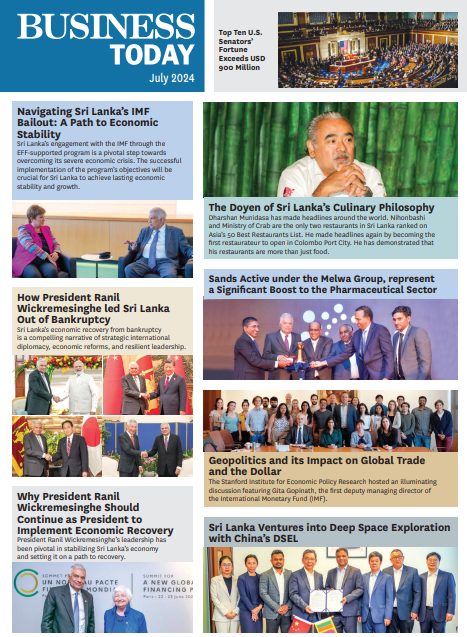
This year has been a time of change for Sri Lanka and represents a new direction in terms of economic and political thinking. In a historic move, a national government was formed by President Maithripala Sirisena; the United National Party (UNP) as the majority party in the government is headed by Prime Minister Ranil Wickremesinghe. The people of this country including the private sector have great expectations of the new government – an equal playing field, good governance and transparency. The progress so far since the formation of the government in August 2015 has been positive and it is the hope that the wheels of the economy will continue to turn on this alternative path.
By Udeshi Amarasinghe
The national government was formed with the majority UNP and members from the opposition SLFP of which President Maithripala Sirisena is the leader. Taking a turn in the right direction the Opposition Leader was appointed from the Tamil community, which signified an era of reconciliation and respect. Sri Lanka for the past few years had been living in isolation from the rest of the world, in a self-made bubble, which became a concern as a country cannot be alone in a global environment where every aspect of life is connected. With the inception of the new government relationships with many countries improved and we became reconnected with more possibilities and avenues to make use of. The resolution, which was tabled by the United States, Sri Lanka and other countries at the UN Human Rights Council, showed that we could come to an agreement without compromising our sovereignty and national integrity.
Such an approach has also produced positive results in other areas. The area discussions on the reinstating of the GSP Plus scheme as well as lifting of the EU-IUU fishing ban. Such endeavours will be an encouragement for Sri Lankan businesses to be proactive and become global players. The Business Today TOP 25, the leaders of corporate Sri Lanka have a great responsibility. They have the experience, the ability and the impetus to become global companies. The market is not only Sri Lanka but overseas as well. While many groups have ventured into other markets, they have the capability to do more. Government to government relationships are vital in these endeavours and it is essential that the private sector and government work together as one entity with a common goal.
The United National Party has always been seen as the political party that is more private sector or business oriented, where the economy is energised through its policies. Many pioneering projects and economic policies have been implemented during UNP regimes. As such, while this government is a ‘national government’, there is great expectation that the much needed boost and direction will be there.
The economic policy direction stipulated by Prime Minister Ranil Wickremesinghe in his five-point plan is based on a ‘knowledge-based economy that thrives in a socially competitive market’. Recognising the fact that economic models have evolved to more than capitalist and socialist programmes, the direction is that there will be ‘equitable dividends for all society through regulation of competitive market forces under complete government supervision’. Through this the open economy will be broadened, which will result in economic democracy.
Government Direction Is That There Will Be ‘Equitable Dividends For All Society Through Regulation Of Competitive Market Forces Under Complete Government Supervision’.
With Sri Lanka emerging as a middle-income nation, the people of the country should no longer depend on subsidies or ‘hand outs’. We should spend for what we need and not expect the state to provide everything. This may mean action such as tax revisions, increase in utility bills, revision of leasing rates and facilities, which has already been implemented. This may be difficult at the start but if Sri Lanka is to progress further to become a developed country such measures are necessary.
The decision to allow the Sri Lankan rupee to be more market oriented, where it was allowed to float, was the correct one. The country will feel the initial pressure when such decisions are implemented but we need to understand the long-term benefits of such measures. We cannot live in a self-made bubble of utopia, because ultimately that bubble will burst. Therefore, it is best that we follow a pragmatic appoach, which is envisaged by the current government. The manner in which ministries were defined and allocated also reflected the understanding and vision for the country’s growth.
This is a time that everyone should be open-minded and literally ‘think out of the box”. We are at a crucial point in our history where we need to realise that we can maintain our Sri Lankan identity while being a strong global player. There are so many nations that have done so before us. This is our time – Sri Lanka.
We congratulate the Business Today TOP 25 for their achievements and hope that they too will be active partners in this era of promising change.
The Business Today TOP 25 is strictly based on the published information of companies listed in the Colombo Stock Exchange. Financial criteria considered include Share Turnover, Revenue, Profit after Tax, Return on Equity, Earnings per Share, Market Capitalisation and Value Addition. Weights are assigned to the criteria without any prejudice.
The Business Today TOP 25 have been selected on the basis of their financial performance during the financial year ending December 31, 2014 and March 31, 2015 with the assistance of KPMG Ford Rhodes, Thornton & Co.
| 01. | John Keells Holdings | 22.750 |
| 02. | Commercial Bank of Ceylon | 22.200 |
| 03. | Hatton National Bank | 20.450 |
| 04. | Ceylon Tobacco Company | 19.500 |
| 05. | Distilleries Company of Sri Lanka | 19.000 |
| 06. | Dialog Axiata | 18.050 |
| 07 | Lanka Orix Leasing Company | 16.100 |
| 08. | Bukit Darah | 16.050 |
| 09. | Sri Lanka Telecom | 15.700 |
| 10. | Sampath Bank | 15.200 |
| 11. | Hayleys | 13.300 |
| 12. | Aitken Spence | 11.500 |
| 13. | Nestle Lanka | 11.350 |
| 14. | Vallibel One | 11.300 |
| 15. | National Development Bank | 10.800 |
| 16. | DFCC Bank | 10.400 |
| 17. | People’s Leasing & Finance | 8.850 |
| 18. | Central Finance | 7.600 |
| 19. | Chevron Lubricants Lanka | 7.300 |
| 20. | Seylan Bank | 6.150 |
| 21. | Ceylinco Insurance | 6.000 |
| 22. | Nations Trust Bank | 4.200 |
| 23. | Hemas Holdings | 3.800 |
| 24. | Access Engineering | 3.500 |
| 25. | Lanka IOC | 3.350 |






